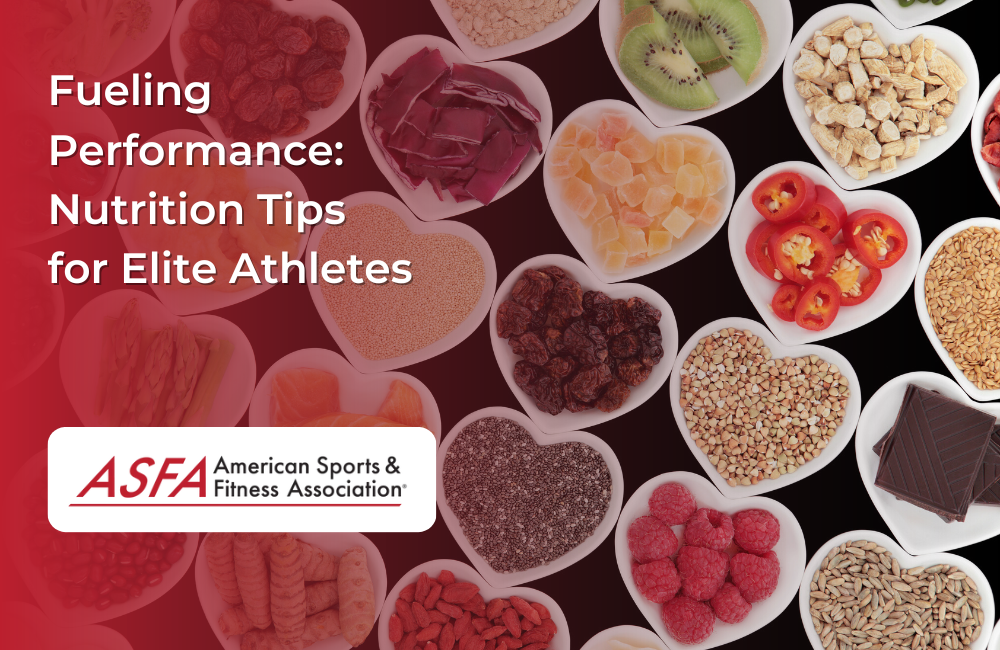Elite athletes require optimal nutrition to perform at their best. The right balance of macronutrients, micronutrients, and hydration can significantly impact an athlete's endurance, strength, recovery, and overall performance. In this blog, we'll explore essential nutrition tips specifically tailored for elite athletes.
Balanced Macronutrient Intake:
Carbohydrates:
Carbohydrates are the body's primary source of energy, especially during high-intensity activities. Elite athletes should focus on complex carbohydrates like whole grains, fruits, and vegetables to provide sustained energy. The timing of carbohydrate intake is crucial, with a preference for pre-workout and post-workout meals to replenish glycogen stores.
Protein:
Protein is essential for muscle repair and growth. Elite athletes require more protein than sedentary individuals. Sources like lean meats, poultry, fish, dairy, and plant-based options (tofu, legumes) should be included in the diet. Protein intake should be distributed throughout the day, with emphasis on post-exercise protein to support recovery.
Healthy Fats:
While carbohydrates are vital for immediate energy, fats serve as a source of long-lasting fuel. Focus on healthy fats from sources like avocados, nuts, seeds, and fatty fish. These fats support overall health and can be beneficial for endurance activities.
Micronutrient-Rich Foods:
Elite athletes need an abundance of vitamins and minerals to support various physiological processes, including muscle contraction, energy production, and immune function. Ensure a diverse diet that includes plenty of fruits and vegetables to provide essential vitamins and minerals. In some cases, supplementation may be necessary, but consult a healthcare professional or registered dietitian for personalized guidance.
Hydration:
Proper hydration is critical for athletic performance. Dehydration can impair endurance, strength, and coordination. Elite athletes should develop a personalized hydration plan that considers factors like sweat rate, exercise duration, and environmental conditions. Water is typically sufficient for hydration, but for intense or prolonged exercise, electrolyte-rich beverages can be beneficial.
Meal Timing:
The timing of meals and snacks can impact energy levels and recovery:
- Pre-Workout: A balanced meal containing carbohydrates, protein, and some fats about 2-3 hours before exercise provides sustained energy.
- During Exercise: For endurance events lasting more than an hour, consider consuming easily digestible carbohydrates like energy gels or sports drinks.
- Post-Workout: Replenish glycogen stores and support muscle recovery with a meal or snack containing carbohydrates and protein within the first 30 minutes to 2 hours after exercise.
Individualized Plans:
Elite athletes have varying nutritional needs based on their sport, body composition, and training volume. Work with a registered dietitian who specializes in sports nutrition to develop a personalized nutrition plan. They can calculate your specific calorie and macronutrient requirements.
Avoid Empty Calories:
Minimize the consumption of empty-calorie foods and beverages that provide little nutritional value. These include sugary snacks, sodas, and highly processed foods. Focus on nutrient-dense options to fuel your body effectively.
Recovery Nutrition:
Recovery nutrition is vital to reduce muscle soreness and optimize training adaptations. Include both carbohydrates and protein in your post-exercise meal or snack to enhance recovery. Chocolate milk, for example, offers an ideal combination of carbs and protein.
Plan for Competition:
In the days leading up to a competition, adjust your diet to optimize energy stores. This may involve carbohydrate loading and avoiding foods that could cause digestive discomfort.
Supplementation:
While whole foods should be the primary source of nutrients, some elite athletes may benefit from supplements like vitamins, minerals, or protein powder to fill specific nutritional gaps. Consult with a sports dietitian to determine if supplementation is necessary and safe.
Consistency:
Consistency in your dietary habits is key to maintaining optimal performance. Make nutrition a daily priority rather than relying on sporadic changes.
Nutrition plays a pivotal role in the success of elite athletes. A well-balanced diet that provides the right mix of macronutrients, micronutrients, and hydration is essential for peak performance, recovery, and overall health. To achieve these nutritional goals, collaborate with a registered dietitian or sports nutritionist who can tailor a plan to meet your specific needs and help you reach your athletic potential.





